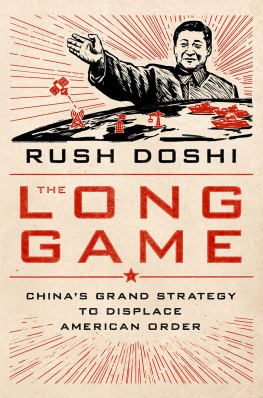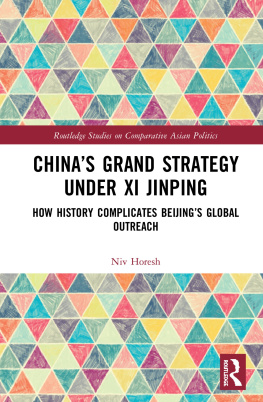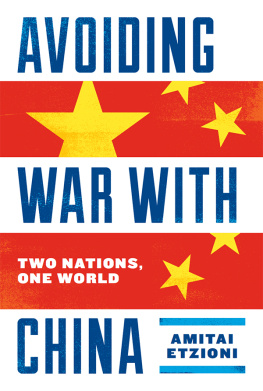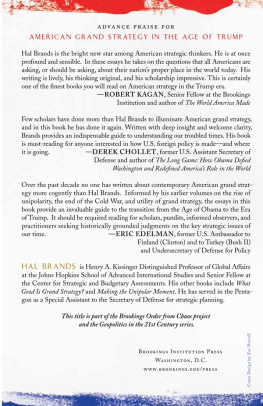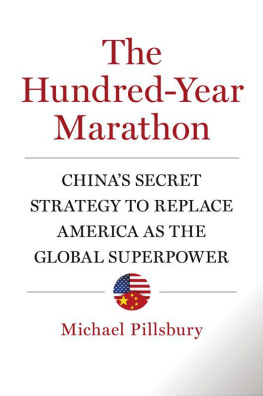Advance Praise for The Long Game
The Long Game brings whats been largely missing from debate on US-China relations: historically informed insight into the nature of Chinas Leninist system and strategy.
Kevin Rudd, President of the Asia Society and former Prime Minister of Australia
The Long Game is essential in understanding Chinas approach to the evolving US-China relationship and global order. Unique in scope and unmatched in substance, Rush Doshis masterfully researched work describes clearly the economic, political, and military contours of Chinas strategic approach. The observations, analysis, and recommendations of this superb work must be foundational to any China playbookbusiness, political, or military.
Admiral Gary Roughead, U.S. Navy (Retired)
What does China want? Rush Doshi makes such a cogent case, based on a wealth of Chinese textual and behavioral evidence, that Chinas consistent strategy has been to displace the United States that he persuades me to re-examine my view that Chinas aims are open-ended and malleable. His compelling book should become an instant classic in the China field and required reading for everyone trying to figure out Americas own best strategy toward China.
Susan Shirk, Professor and Chair of the 21st Century China Center, University of California-San Diego
A must-read for anyone wrestling with the China Challenge. Doshis careful analysis of Chinese language documents make a powerful case that China is pursuing a coherent grand strategy to overturn the US-led international order.
Graham Allison, Professor of Government, Harvard Kennedy School
Doshi has brilliantly limned a new framework for understanding both the global ambition and the strategic challenges posed by Xi Jinping and his wolf warrior diplomacy. If youre looking for the one book that best illuminates the historical logic of his unrepentant China Dream, The Long Game is it.
Orville Schell, Director, Center on US-China Policy, the Asia Society
Drawing from a vast array of Chinese sources, Rush Doshi presents a novel account of the evolution of Beijings grand strategy. Doshi argues persuasively that shifts in Chinas behavior are driven by the Communist Partys collective assessment of trends in the global balance of power rather than by the personalities of individual leaders. The implications are not reassuring: Chinas increasingly aggressive attempts to displace the US and transform the international system began before Xi Jinping took power and will likely persist after he is gone. This should be required reading for scholars and policymakers alike.
Aaron L. Friedberg, Professor of Politics, Princeton University
The debate over whether China has a strategy to displace American leadership in Asia is over. Now comes the first authoritative account of what that strategy is. Using a vast array of original sources, Rush Doshi does unprecedented forensic work on the origins of Chinese grand strategy and its prospects for success.
Michael J. Green, author of By More than Providence: Grand Strategy and American Power in the Asia-Pacific since 1783
If you doubt that China has been pursuing a long-term, comprehensive strategy to achieve global primacy, read Rush Doshi's book. In this brilliant, definitive work, Doshi details the vaulting ambition of Beijing's agenda. Everyone interested in the future of American power and world order should read it nowor weep later.
Hal Brands, Johns Hopkins University and American Enterprise Institute

Oxford University Press is a department of the University of Oxford. It furthers the Universitys objective of excellence in research, scholarship, and education by publishing worldwide. Oxford is a registered trade mark of Oxford University Press in the UK and certain other countries.
Published in the United States of America by Oxford University Press
198 Madison Avenue, New York, NY 10016, United States of America.
Rush Doshi 2021
All rights reserved. No part of this publication may be reproduced, stored in a retrieval system, or transmitted, in any form or by any means, without the prior permission in writing of Oxford University Press, or as expressly permitted by law, by license, or under terms agreed with the appropriate reproduction rights organization. Inquiries concerning reproduction outside the scope of the above should be sent to the Rights Department, Oxford University Press, at the address above.
You must not circulate this work in any other form and you must impose this same condition on any acquirer.
Library of Congress Control Number: 2021938602
ISBN 9780197527917
eISBN 9780197527870
DOI: 10.1093/oso/9780197527917.001.0001
Cover illustration by Jonathan Bartlett.
All statements of fact, opinion, or analysis expressed are those of the author and do not reflect the official position or views of the National Security Council (NSC) or the US Government. No content should be construed as asserting or implying US Government or NSC authentication of information or endorsement of the authors views. The authors work on this report was completed prior to his government service.
For Kurt
For Parshu, Rupa, Uday, and Sohum
And for Jennie
BRIDGING THE GAP
Series Editors
James Goldgeier
Bruce Jentleson
Steven Weber
The Logic of American Nuclear Strategy:
Why Strategic Superiority Matters
Matthew Kroenig
Planning to Fail:
The US Wars in Vietnam, Iraq, and Afghanistan
James H. Lebovic
War and Chance:
Assessing Uncertainty in International Politics
Jeffrey A. Friedman
Delaying Doomsday:
The Politics of Nuclear Reversal
Rupal N. Mehta
Delta Democracy:
Pathways to Incremental Civic Revolution in Egypt and Beyond
Catherine E. Herrold
Adaptation under Fire:
How Militaries Change in Wartime
David Barno and Nora Bensahel
The Long Game:
China's Grand Strategy to Displace American Order
Rush Doshi
Contents
No book is a solitary effort, and I owe a debt of gratitude to so many who made this book possible.
My earliest tutors in Chinese foreign policy and political science were at Princeton. Were it not for them, I would never have written this book nor pursued this career. Gilbert Rozman provided the initial spark with his classes on Asian geopolitics. Tom Christensen kept it burning, and I can still quote from his lectures on Chinese foreign policy and on the importance of public service. Robert Keohane provided the kindling by teaching me the craft of research and patiently showing me how to be a social scientist. And Aaron Friedberg, to whom I owe a great professional and intellectual debt, fanned the flames by taking me on as a research assistant and then turning me loose on a wide array of professional challenges. I am grateful for his nearly fifteen years of constant support and thoughtful advice.
This book also owes a debt to many professional mentors, all of whom took a chance on me. Susan OSullivan, a tireless advocate for human rights in China, gave me my first opportunity to serve in government and changed the way I understood China and foreign policy. Josh Bolten offered me my first full-time job in Washington, provided me an early model of service and character, and placed me into the company of mentors like Dan Price, Mike Smart, and Clay Lowery who have taught me so much over the years. Jackie Deal and Steve Rosen offered me my first job in defense research, and that experience led me to pursue graduate school and a career at the intersection of China and foreign policy.

